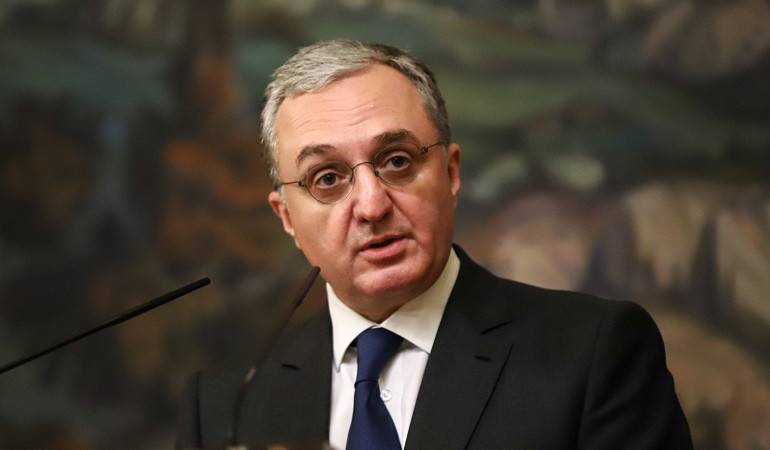Foreign Minister Zohrab Mnatsakanyan’s Interview to “BBC Newshour”
12 October, 2020Zohrab Mnatsakanyan: I am in Moscow on a preplanned visit for talks with our Russian colleagues on many issues of our bilateral agenda. But, of course it is overwhelmed by one particular question, one big crisis that we have before us: this escalation in Nagorno-Karabakh; this outright aggression against our people, our compatriots in Nagorno-Karabakh. We have achieved a very important statement to establish ceasefire, now to de-escalate: the first step to do that for humanitarian purposes and further to consolidate the ceasefire so that we go back to normal peaceful resolution of the process.
BBC: But there was a ceasefire declared on Saturday and it looks as though it is deeply fragile now.
Zohrab Mnatsakanyan: Yes, it remains very fragile and it remains very concerning to us because what we have been observing is this overwhelming continuation of the attacks and the attacks on the Nagorno-Karabakh settlements and positions; defense positions. And we are still hopeful that we can bring this back to normal, to what we have agreed - to the ceasefire so that we can resume normal work. First of all we have to do some very important humanitarian action as we have agreed on Saturday.
BBC: Let me ask you about the breaking of the ceasefire. Officials on the Azeri side say that seven people were killed and dozens injured when an Armenian missile strike hit a residential block in Ganja. Is that true?
Zohrab Mnatsakanyan: Well, look the Nagorno-Karabakh defense forces are doing everything to defend themselves, because since Saturday morning, and this is what I am absolutely outraged about, Azeris have been continuously attacking the settlements and the defense positions. Stepanakert and other settlements have been under continuous attack all the way until very late night of Saturday evening and continuing into Sunday morning. And still we have this fragility on the ground. Stepanakert is totally brought to a very difficult situation. So many destructions. So many casualties. So many people who are displaced. The infrastructure, the energy supply and everything is brought to such a condition that people are in a very difficult situation. The same is about the other cities and towns.
BBC: Let me ask you about the status of Nagorno-Karabakh. The self-declared government of this enclave last week asked for it to be recognized internationally. Does Armenia back that?
Zohrab Mnatsakanyan: Well, of course, Armenia backs everything that supports the existential physical security of our compatriots in Nagorno-Karabakh. We have been very careful and very patient not to undermine the peaceful settlement. But what we have been observing over these past two weeks is the choice of the military option for the resolution, the choice of imposing solutions by military aggression from Azerbaijan supported by Turkey.
BBC: Why don’t you either annex the territory or recognize its independence? Those are the options that are open to you.
Zohrab Mnatsakanyan: Exactly, that we have to be responsible. We do not want to deny the chance for the peaceful resolution.
BBC: But if your Prime Minister says that Karabakh is Armenia it’s quite clear you don’t want to recognize its independence.
Zohrab Mnatsakanyan: Don’t take it out of context. The Prime Minister of Armenia has been very consistent about the compromise solution, that there is no other way but to achieve a compromise solution that is acceptable to the people of Armenia, people of Nagorno-Karabakh, and people of Azerbaijan. There can only be a compromise. When this statement from the Prime Minister is taken out of context- you have what you have. Because the Prime Minister was saying that Armenia is investing a lot of effort in its own reform, in its own development, and it cannot be indifferent to its compatriots in Nagorno-Karabakh. And in this context Armenia will be supporting, as the only guarantor of their security, will be supporting our compatriots in Nagorno-Karabakh. In the context of the conflict he was talking strictly, directly, and consistently about the compromise.
BBC: How confident are you that this ceasefire, such as it is currently, is going to hold in any way?
Zohrab Mnatsakanyan: Look, I think this has been also a very good part of our conversation here in Moscow, and we will continue also talking with the Co-Chairs of the OSCE Minsk Group- France and the United States, who are part of this mediation effort. Russia is doing a great job, France and the US are working together. Now, we shouldn’t deny any chance for this ceasefire to hold. We have to carry on with the verification mechanism, which helps us to bring back ceasefire, to bring back peace, so that we go back to the peaceful settlement. We are not losing hope, we will continue working very hard on this.
The interview is available at this link: https://www.bbc.co.uk/sounds/play/p08v2jx6


